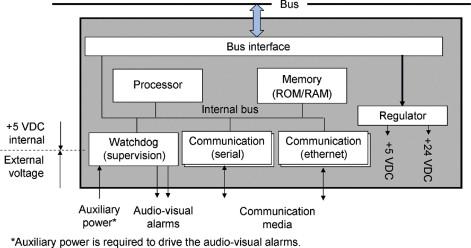Definition
Theinternalbusconnectsallthestructuralunitsoftheprocessorinternally.Itswidthcanbe8,16,32,64,or128bits.
Forexample,intheCPU,thebususedtotransferdatabetweenregistersandbetweenthearithmeticlogicunitALUandthecontrolunitiscalledtheon-chipbus(thatis,thebusinsidethechip).
Internalbustechnology
Severalpopularinternalbustechnologies:
1,I2Cbus
TheI2C(Inter-IC)buswasintroducedbyPhilipsin1982.Itisanewtypeofbusstandardwidelyusedinthefieldofmicroelectroniccommunicationcontrolinrecentyears.Itisaspecialformofsynchronouscommunication,whichhastheadvantagesoffewerinterfacelines,simplifiedcontrolmode,smalldevicepackageform,andhighercommunicationspeed.Inmaster-slavecommunication,therecanbemultipleI2CbusdevicesconnectedtotheI2Cbusatthesametime,andthecommunicationobjectcanbeidentifiedthroughtheaddress.
2,SPIbus
SerialperipheralinterfaceSPI(serialperipheralinterface)bustechnologyisasynchronousserialinterfaceintroducedbyMotorola.MostMCUs(microcontrollers)producedbyMotorolaareequippedwithSPIhardwareinterfaces,suchas68seriesMCUs.TheSPIbusisathree-wiresynchronousbus.Becauseofitsstronghardwarefunctions,theSPI-relatedsoftwareisquitesimple,allowingtheCPUtohavemoretimetoprocessothertransactions.
3,SCIbus
TheserialcommunicationinterfaceSCI(serialcommunicationinterface)isalsointroducedbyMotorola.ItisauniversalasynchronouscommunicationinterfaceUART,whichisbasicallythesameastheasynchronouscommunicationfunctionofMCS-51.
Internalbusdevelopment
FSBandFSBbus(FrontSideBus)
FSBandfrontsidebusaretwodifferentThereasonwhyeveryoneisconfusedisthatintheancientPentiumera,thefrequencyvaluesofthetwoareoftenthesame.
TheFSBreferstotheexternalclockfrequencyoftheCPU,CPUmainfrequency=FSBXmultiplier.InthePentiumera,theFSBoftheCPUisgenerally60/66MHz.StartingfromthePentiumII350,theFSBoftheCPUisincreasedto100MHz.

Thespeedofthefront-sidebusreferstothespeedofthebusbetweentheCPUandtheNorthbridgechip,andrepresentsthespeedofdatatransmissionbetweentheCPUandtheoutsideworld.
Thereasonwhythetwoconceptsoffront-sidebusandFSBareeasytoconfuseisthatthefront-endThebusfrequencyisthesameastheFSB,sothefrontsidebusisoftenreferredtoastheFSB,whichwilleventuallycausesuchmisunderstandings.
Withthedevelopmentofcomputertechnology,peoplehavefoundthatthefront-sidebusfrequencyneedstobehigherthantheexternalfrequency.Therefore,DDR(DoubleDateRate)technologyandQDR(QuadDateRate)technologyareproduced,makingthefrequencyofthefront-sidebusbecomeTheFSBis2times(AMD'sK7processor)and4times(Intel'sPentiumprocessorCoreprocessor).Sincethen,thedifferencebetweenthefrontsidebusandtheFSBhasbeenpaidattentionto.
Thename"front-sidebusFSB"isaconceptproposedbyAMDwhenitlaunchedtheK7CPU.Thespeedofthefront-sidebusreferstothespeedofdatatransmission,becausethemaximumbandwidthofdatatransmissiondependsonallthedatatransmittedatthesametimeWidthandtransmissionfrequency,thatis,databandwidth=(busfrequencyXdatabitwidth)÷8.
Thefront-sidebusfrequenciesthatcanbereachedonthePCare266MHz(AMD),333MHz(AMD&Intel),400MHz(AMD&Intel),533MHz(Intel),800MHz(Intel),1066MHz(Intel),1333MHz(Intel),1600MHz(Intel),etc.ThelatestIntelExtremeEditionprocessorQX9770usesa1600MHzfront-sidebus,andthemaximumbandwidthis:1600×64÷8=12.8G/s.
Thegreaterthefrequencyofthefront-sidebus,thegreatertheamountofdatatransferbetweentheCPUandtheNorthBridge,andthemorecapableofgivingfullplaytothefunctionsoftheCPU.Onthecontrary,thelowerfrontsidebuswillnotbeabletosupplyenoughdatatotheCPU,whichlimitstheperformanceoftheCPUandbecomesasystembottleneck.
HTbus(HyperTransport)
StartingfromAMD’sK8processing,AMDandIntel’sinternalbusdevelopmentbegantopartways,andIntelcontinuedtouseFSBIntel’sCore2CPU,andAMDdevelopedtheHTbus(HyperTransport)againstIntel.
TheHTbusisahigh-speedserialbusspeciallydesignedbyAMDfortheK8platform.Itsdevelopmenthistorycanbetracedbackto1999andwasoriginallynamed"LDTbus"(LightningDataTransport).InJuly2001,thistechnologywasofficiallylaunched,andAMDalsorenameditHyperTransport.Subsequently,Broadcom,Cisco,Sun,NVIDIA,ALi,ATI,Apple,Transmeteandmanyothercompanieshavedecidedtoadoptthisnewbustechnology,andAMDalsousedthistoformtheHyperTransportOpenAlliance,thuspushingHyperTransporttotheindustry.
Thefirstgeneration:HT'soperatingfrequencyisintherangeof200MHz-800MHz,andthemaximumbandwidthcanreach6.4GB/sinthebidirectional16-bitmode.
Thesecondgeneration:InFebruary2004,theHyperTransportTechnologyAllianceofficiallyreleasedtheHT2.0specification.DuetotheuseofDual-datatechnology,thefrequencywassuccessfullyincreasedto1.0GHz,1.2GHzand1.4GHz,Thebusbandwidthofthebidirectional16bitmodehasbeenincreasedto8.0GB/s,9.6GB/sand11.2GB/s.
Thethirdgeneration:OnNovember19,2007,AMDofficiallyreleasedtheHT3.0busspecification,providing1.8GHz,2.0GHz,2.4GHz,and2.6GHzfrequencies,upto32channels.With32-bitchannels,thebidirectionalbandwidthcanreachupto41.6GB/s.
QPIbus
BecausethemaximumbandwidthprovidedbyAMD’sHT3.0farexceedsthebandwidthofIntel1600FSB,inordertocounterHT3.0,Intelhastakenanotherapproach,TheQPIbusisproposed.
Wecalculatedearlierthat1600FSBcanprovide12.8G/sbandwidth,butsuchahighbandwidthcanonlymeetthebandwidthrequirementsofDDR2800dual-channelmemory(800X64X2/8=12.8G/s),ifyouuse1066orevenhigher1333memoryatthistime,theFSBneedstobeincreasedtoahigherfrequency,nottomentionPCIbus,PCI-Ebus,USB,SATAandotherdevices.Occupyacertainbandwidth.Underthecurrentproductiontechnologyandframework,itismoredifficulttoincreasethefrequency.EvenifsomeplayersincreasetheFSBto2400,theheatgeneratedisveryscary.
Withtheimprovementofprocessorcoreperformanceandtherapidincreaseinthenumberofcores,FSBisincreasinglybecomingabottleneckandmustberesolved.IfIntelwantstobeinvincibleinthemulti-coreera,theprimaryproblemistosmoothlysolvetheproblemofsystemresourceallocationandgivefullplaytotheadvantagesofmulti-core.ThisistheultimategoalofIntel'sQPIbustechnology.
ThebiggestimprovementofQPIistoprovideamazingoutputtransmissioncapacity,between4.8to6.4GT/s.Thebitwidthofeachdirectionofaconnectioncanbe5,10,or20bits.Therefore,aQPIfull-widthlinkineachdirectioncanprovideabandwidthof12to16BG/s,andthebandwidthofeachQPIlinkis24to32GB/s,whichisequivalentto2-3timesof1600FSB,whichisbasicallythesameastheHT3.0bandwidth.
Inaddition,anotherhighlightofQPIisthatitsupportsmultiplesystembusconnections,whichIntelcallsmulti-FSB.Thesystembuswillbedividedintomultipleconnections,andthefrequencyisnolongerasinglefixed,andthereisnoneedtoconnectthroughtheFSBasbefore.
TherevolutionarysignificanceoftheQPIbusrelativetotheFSBissignificant.IthasbroughtabouttheinnovationofthePCmanufacturingstructureandabandonedthepreviousconceptoftheNorthBridgeandtheSouthBridge.
